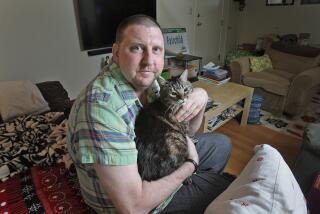English Papers Have the Last Word in Obituaries
- Share via
In this era of unforgiving journalism, obituary writers may often ignore that Latin injunction, De mortuis nihil nisi bonum, or, “Of the dead, (say) nothing but good.”
Nevertheless, unless the deceased has been a scoundrel who abused his wife, stole from the poor and cheated the public, his sins are likely to be downplayed or overlooked in his final notice.
Evidently this tradition no longer applies in England. Joan Whitmore of Pasadena has sent me two obituaries clipped from the London Daily Telegraph in which the subjects, neither of them evidently bad men, have been dealt with rather meanly, it seems to me, by the obituary writer.
One of the notices reports the passing of William Fletcher-Vane, the 1st Lord Inglewood, Conservative Member of Parliament for Westmorland from 1945 to 1964.
At the outset Fletcher-Vane (the Telegraph does not refer to him again as Lord Inglewood) is pictured as a perhaps ineffective but typical member of the fading nobility. “He was of a breed now rare in Westminster: the English country gentleman, happy to serve his constituents and party from the backbenches and to tend his splendidly wooded estate.”
Indeed, Fletcher-Vane’s photograph tends to verify that stereotype of landed English gentry. His face is long and austere under a high forehead and strong eyebrows; the nose long and thin; the mouth thin and downward curved, the chin large and out-thrust.
After citing his service in foreign affairs, the obituary notes: “Fletcher-Vane had an agreeable Commons manner but he was a hesitant speaker and his periods in office were by no means distinguished.”
We begin to see the cracks in Fletcher-Vane’s armor. Then: “There was some surprise when he was created Baron Inglewood in 1964.” One sees the raised eyebrows among his peers.
After listing his lineage the obit notes that Fletcher-Vane tended the ancient woods surrounding his estate “with skill and devotion,” adding many trees.
Then it recalls that, “in the Commons Fletcher-Vane was capable of asperity when roused. A notable occasion was when Manny Shinwell, a one-time pacifist, was appointed War Minister in the Labor Government of 1945.
“Fletcher-Vane described this as ‘inexplicable,’ and, while acknowledging it was wrong for a serving officer to criticise his Secretary of State, declared: ‘If he prefers a charge against me under the Army Act, I say I don’t care.’ ”
It seems to me that in this instance Fletcher-Vane was rather more effective than he was made out to be in earlier paragraphs; and one does wonder about the wisdom of appointing a former pacifist as war minister in the last year of the war.
Perhaps even more curious is the notice given the Rev. Paul Kingdon, whose limitations are set forth at once: “The scholar priest, who has died aged 82, was well known in Oxford in the 1930s, but never fulfilled his early promise. . . .”
One feels sympathetic toward the old gentleman who is dismissed, at the end, with less than faint praise.
“Although a Fellow of Exeter College, Oxford, from 1933 to 1945,” it goes on, “he had no vocation as a teacher. He was relentless in the pursuit of the arcane detail and lectured in terms so obscure that few of his students could understand him.” (I am reminded of the deconstructionists who prosper today in American universities.)
Kingdon not only had no vocation as a teacher, but also none as a man of the cloth. “He fared little better as a parish priest. He had a remarkable capacity for creating misunderstanding and often left a trail of havoc behind him.”
(I am reminded of the Rev. William Archibald Spooner, the Anglican clergyman who is said to have told his flock, “The Lord is a shoving leopard,” and gave his name to that peculiar linguistic blunder.)
Kingdon is credited with a history of the church in Germany and a translation of a theological text that were “models of scholarship and lucidity,” yet when he left Oxford for a parish he was not a success, and neither was he when he returned to teaching.
“Kingdon then became vicar of Chewton Mendip, near Bath, and was also appointed as a lecturer at Wells Theological College. He was quite unfitted for both these posts, the second of which lasted no more than a fortnight.”
It ends: “His wife, Joan, predeceased him.” One wants to add, “fortunately for her.”


